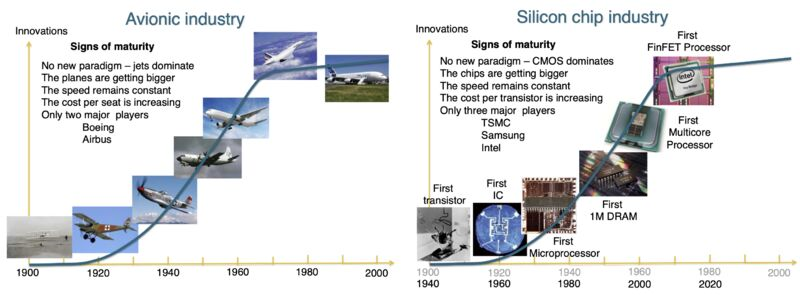
Today, the CMOS chip manufacturing is the pinnacle of the human technology defining economy, society and perhaps us as modern humans. This was highlighted by the recent chip shortage, followed by the ‘shocking’ realization that more than 80% of all chips are manufactured in the Far East.
Important decisions need to be taken by the Western Governments regarding the future of the CMOS technology. When contemplating such decisions some of the ‘post’ or ‘beyond’ CMOS mythology from the recent past need to be re-examined.
Things were looking good with CMOS technology development on the West at the beginning of the century with Intel leading the advanced CMOS technology by two generations and Europe making significant contributions led by ST and LETI and complemented by IMEC. It was easy in such circumstances to take wrong strategic decisions. For example, NFS in the US decided that the semiconductor industry does not need any more academic research support and time has come to move to the next ‘big thing’. This thinking suited UK very well too as at that time, we have lost already the advanced CMOS manufacturing anyway. The notion that UK will compensate for this loss by inventing the next ‘big thing’ was politically appealing and financially manageable.
Hence, CMOS was de-prioritized by EPSRC and calls for proposals for the next ‘big thing’ in the ‘post CMOS’ era started to appear. In no particular order, these included carbon nanotubes, graphene, 2D materials, various incarnations of ‘quantum’ including quantum computing…. Despite the fantastic intellectual challenges associated with the corresponding research the realization that none of these have the potential of replace the CMOS technology is slowly coming home.
This is nothing new for the big chip manufacturers including Intel, Samsung and TSMC. Until 2013 the International Technology Roadmap for Semiconductors (ITRS) was ‘the bible’ of the semiconductor industry. Every two years in a new ITRS edition everybody was reading first the emerging technology section. My take from reading this section was that nothing was ‘emerging’ on the horizon capable of replacing CMOS. Not surprisingly, the investments of the biggest semiconductor players in ‘post CMOS’ technologies are a minute fractions of their CMOS R&D budgets.
In my humbled opinion, today there is still nothing on the horizon with potential for replacing CMOS. However, all the evidence suggests the maturing and consolidation of the semiconductor industry. Nothing new with this either, just look at the history of avionic industry: after approximately 80 years of rapid technology development the avionic industry is now a mature industry with only Boeing and Airbus remaining as major players, one of them is in the US and the other one is in Europe. Unfortunately, in the semiconductor industry case, most of the potential winners in the CMOS end game are in the Far East with China emerging as a strong contender.
Asen Asenov (FIEEE, FRSE) is the James Watt Professor in Electrical Engineering and the Leader of the renown Glasgow Device Modelling Group. He directs the development of quantum, Monte Carlo and classical models and tools and their application in the design of advanced and novel CMOS devices. He also was founder and the CEO of Gold Standard Simulations (GSS) Ltd. acquired in 2016 by Synopsys. He is currently also CEO of Semiwise – a semiconductor IP and services company, and a director of Surecore and Ngenics.
Share this post via:





Facing the Quantum Nature of EUV Lithography